World
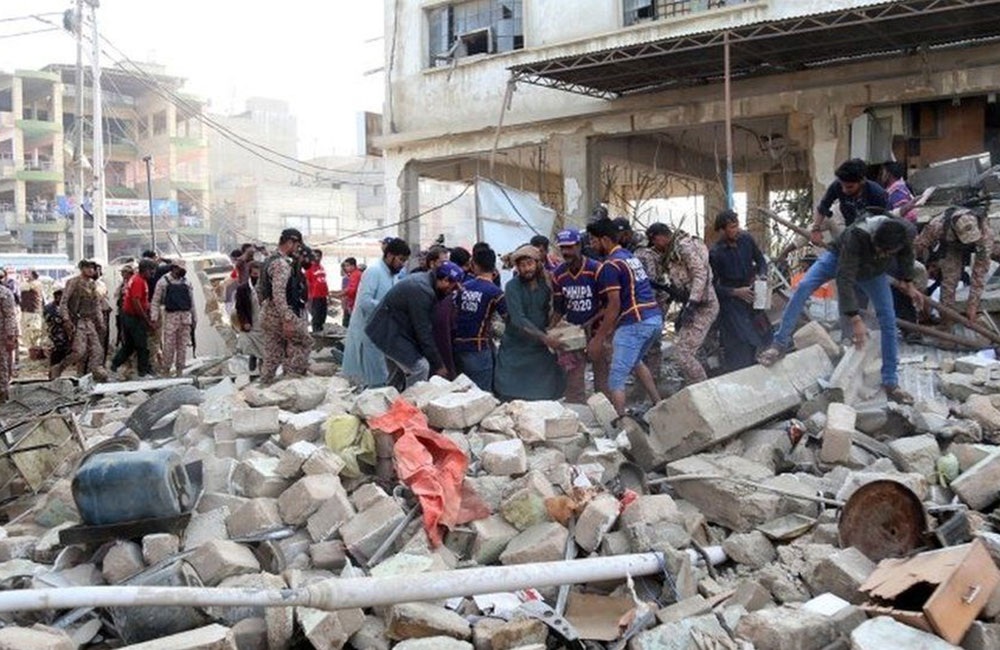
Over 50 killed in blast at Pakistan rally to mark prophet’s birthday
The death toll from a suspected suicide bomb blast at a procession to celebrate the birthday of Prophet Muhammad in Pakistan’s Balochistan province has climbed to over 50, officials and media reports say.
The powerful bomb exploded on Friday at a rally in Mastung district of Balochistan, wounding at least 100 others, including dozens in critical condition, media reports said.
“It seems a suicide attack” senior local police officer Javed Lehri, adding that the bomber blew himself up near the vehicle of Deputy Superintendent of Police Nawaz Gishkori.
Balochistan’s government administrator Atta Ullah said a senior police officer, Mohammad Nawaz, was among the dead. The injured were taken to nearby hospitals, he said.
No group has claimed responsibility for the attack yet.
The country’s interior ministry confirmed a blast carried out by “terrorist elements” in Balochistan.
“The attack on innocent people who came to participate in the procession of Eid Milad-ul-Nabi is a very heinous act,” it said in a statement, referring to the prophet’s birthday.
Friday’s bombing came days after authorities asked police to remain on maximum alert as armed groups could target rallies making the occasion.
Muslims in Pakistan and around the world celebrate the birthday of Islam’s prophet by holding public gatherings.
While the celebration is accepted by a majority of Islamic sects, certain denominations view it as an unwarranted innovation.
Balochistan has in the past been the site of attacks by armed groups.
Earlier this month, at least 11 people, including a prominent religious leader, were injured in a blast in the same district, the Dawn newspaper said.
The gas-rich Balochistan province at the border of Afghanistan and Iran has been the site of a low-intensity rebellion by Baloch separatists for more than two decades.
The separatists initially wanted a share of the provincial resources, but later launched a movement calling for independence. (AL Jazeera)

Candidate in Ecuador's presidential election Fernando Villavicencio shot dead
On Wednesday(09), Fernando Villavicencio, a member of the country's national assembly, was attacked as he left an event in the northern city of Quito.
An intruder assaulted and shot the candidate in the head while he was getting into his car, according to a member of his team.
Ecuador's current president, Guillermo Lasso, has sworn that the "crime will not go unpunished."
According to witnesses, Mr Villavicencio, 59, was shot three times.
The suspect was also shot during a gunfight with security and died as a result of his injuries, the country's attorney general announced on social media.
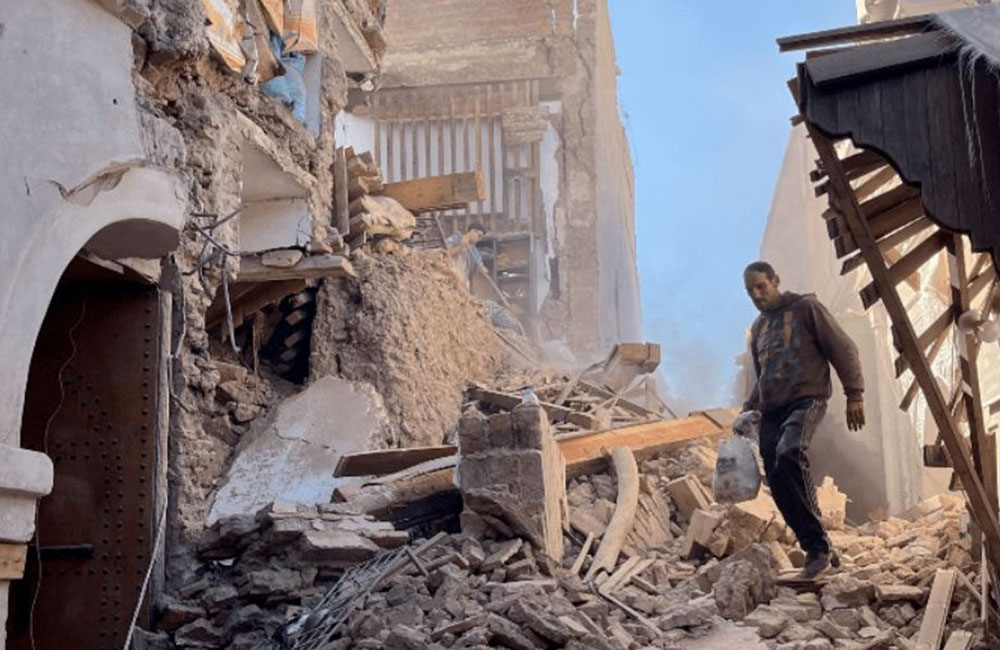
Morocco quake death toll crosses 1,000
UPDATE: Over 1,000 people are now known to have died in the massive 6.8 magnitude earthquake that rocked Morocco on Friday night, international media reported.
Morocco's Interior Ministry said 1,037 are known to have died and over 500 injured. The death toll is expected to rise further as hundreds of the injured are critical and more bodies are being pulled from the rubble. The Moroccan Army joined in the rescue effort and countries as far away as the UK, India and the U.S. offered emergency assistance.
The quake's epicenter was in the Atlas Mountains, 75 km from the city of Marrakesh. The tremor toppled buildings and sent millions scrambling out of their homes in the darkness. The ancient city walls of Marrakesh suffered significant damage.
The tremor occurred at 11:11 pm Morocco time when most people were asleep. The US Geological Survey said that the quake's epicenter was at a depth of 18.5 km.
This is not an area known for massive quakes. It is the largest earthquake ever recorded in Morocco, a country in North Africa that borders the Atlantic Ocean and Mediterranean Sea just south of Spain.
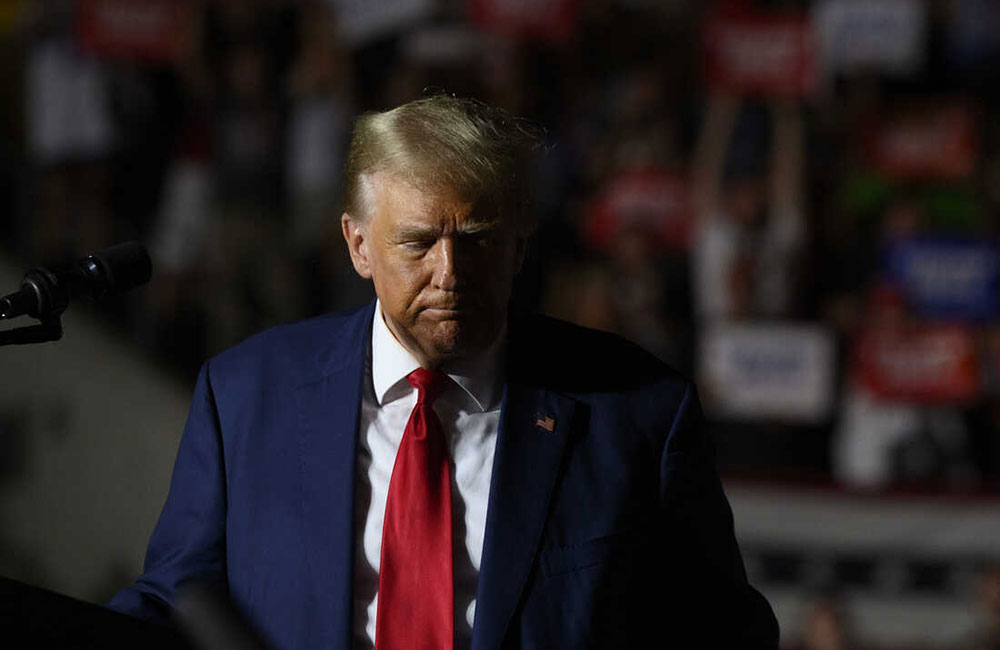
Donald Trump indicted on criminal charges of attempting to overturn results of presidential election
Former U.S. President Donald Trump, 77, was indicted on Tuesday (1st) by a federal grand jury on four criminal charges of attempting to overturn the results of the 2020 presidential election, U.S. media reported. He has denied the charges and is expected to appear in federal district court in Washington, D.C. on Thursday.
The charges include "conspiracy against the rights of citizens", "conspiracy to defraud the United States", "conspiracy to obstruct an official proceeding", and "obstruction of an official proceeding". The court document also describes "conspiracy to impair, obstruct and defeat the federal government function through dishonesty, fraud and deceit".
Six other unnamed persons were also charged, including four lawyers, a Justice Department official and a political consultant. The charges were brought by Special Counsel Jack Smith, who is investigating a mob attack on the U.S. Capitol (parliament) on January 6, 2021, in an attempt to prevent the vice president from officially certifying the election result.
Trump is already facing 40 federal felony charges in connection with mishandling classified government documents that he allegedly illegally kept in his possession after leaving the presidency. The trial is set to commence in May 2024.
The state of Georgia is also likely to indict him on criminal charges of attempting to overturn the result in Georgia of the last presidential election, U.S. media reported. Georgia was a key state that he lost, ensuring his defeat in the election to present President Joe Biden.
He has also been charged by state authorities in the state of New York with 34 counts relating to mishandling election campaign funds, with allegations that he used the funds to pay hush money to an adult film actress that he had a relationship with prior to becoming president. That trial is scheduled for March 2024.
Trump is a candidate for the next presidential election scheduled to be held in November 2024. Under U.S. law, he cannot be disqualified from running even if he is convicted, and also cannot be prevented from carrying out the functions of the presidency if he were to win.
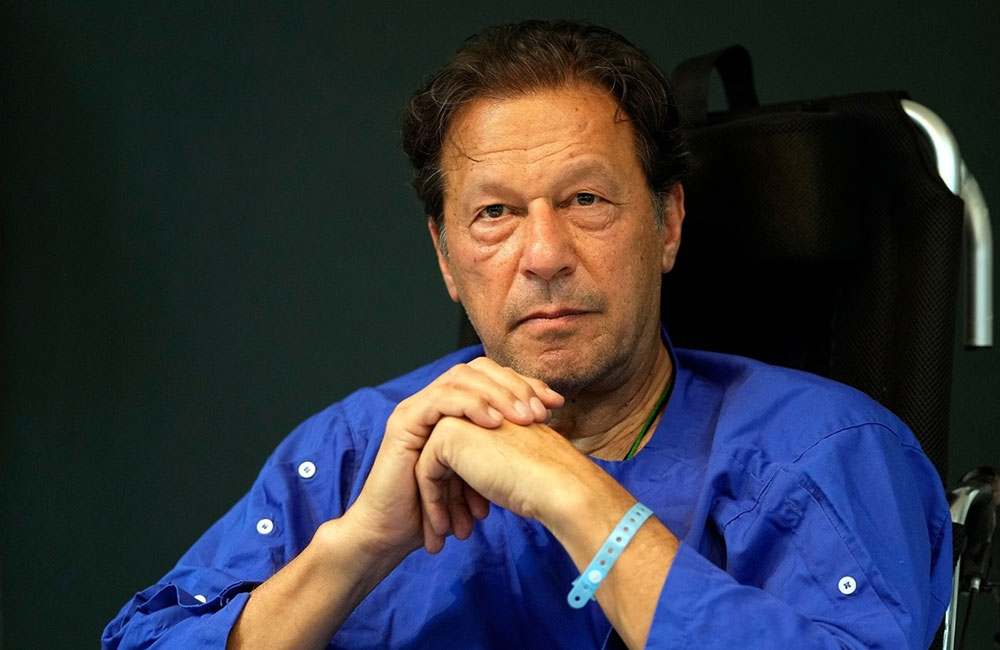
Pakistani court suspends former PM Imran Khan’s graft conviction
The Islamabad High Court on Tuesday suspended former Pakistan Prime Minister Imran Khan’s recent conviction on corruption charges, his lawyer Naeem Panjutha said, though it was unclear whether this would lead to his release from jail.
Khan was imprisoned on Aug.5 after being sentenced to three years in jail for unlawfully selling state gifts during his tenure as prime minister from 2018 to 2022. As a result of the conviction, and with a national election expected in the coming months, Pakistan’s Election Commission also barred Khan from contesting elections for five years.
Khan had filed an appeal against the conviction.
“Our application has been accepted, and the sentence has been suspended,” Panjutha said on messaging platform X, formerly known as Twitter.
The uncertainty over whether Khan would be automatically released as a result of the High Court’s decision is due to other court orders allowing for his arrest in other cases. It is not immediately clear how the ban on his contesting elections will be affected.
Source: Reuters -
Agencies

Victoria Amelina: Ukrainian writer dies after Kramatorsk strike
By George Wright
BBC News
The award-winning Ukrainian writer Victoria Amelina has died from her injuries after a Russian missile hit a pizza restaurant in the eastern city of Kramatorsk on Tuesday.
The war crimes researcher becomes the 13th person to have died in the attack.
The writers' association PEN Ukraine said doctors "did everything they could to save her life, but unfortunately the wound was fatal".
Human rights activists have called the attack a war crime.
Kramatorsk is under Ukrainian control but is close to Russian-occupied parts of Ukraine.
Amelina, 37, was dining with a delegation of Colombian journalists and writers in the city's popular Ria Lounge when the missile hit. Around 60 others were injured in the attack.
She was rushed to hospital in Dnipro, but succumbed to her injuries on Friday, PEN Ukraine said.
"It is with great pain that we inform you that the heart of the writer Victoria Amelina stopped beating on 1 July," the group said in a statement.
"In the last days of Victoria's life, her family and friends were by her side."
Amelina was one of Ukraine's most celebrated young writers who started documenting war crimes after Russia's full-scale invasion last year. She also started working with children near the frontline.
Last year she unearthed the diary of children's writer Volodymyr Vakulenko, who was abducted and killed by Russian troops in the city of Izyum soon after the invasion.
Her first non-fiction book in English, War and Justice Diary: Looking at Women Looking at War, is due to be published.
In an earlier statement confirming that Amelina had been injured in the attack, PEN Ukraine and war crimes watchdog Truth Hounds said that members of both groups had travelled to the frontlines with Amelina.
"Now, Victoria has become a victim of a war crime herself," they said.
A post pinned to her Twitter profile shows Amelina taking a photo of a bombed building in Ukraine.
"It's me in this picture," the post reads.
"I'm a Ukrainian writer. I have portraits of great Ukrainian poets on my bag. I look like I should be taking pictures of books, art, and my little son. But I document Russia's war crimes and listen to the sound of shelling, not poems. Why?"
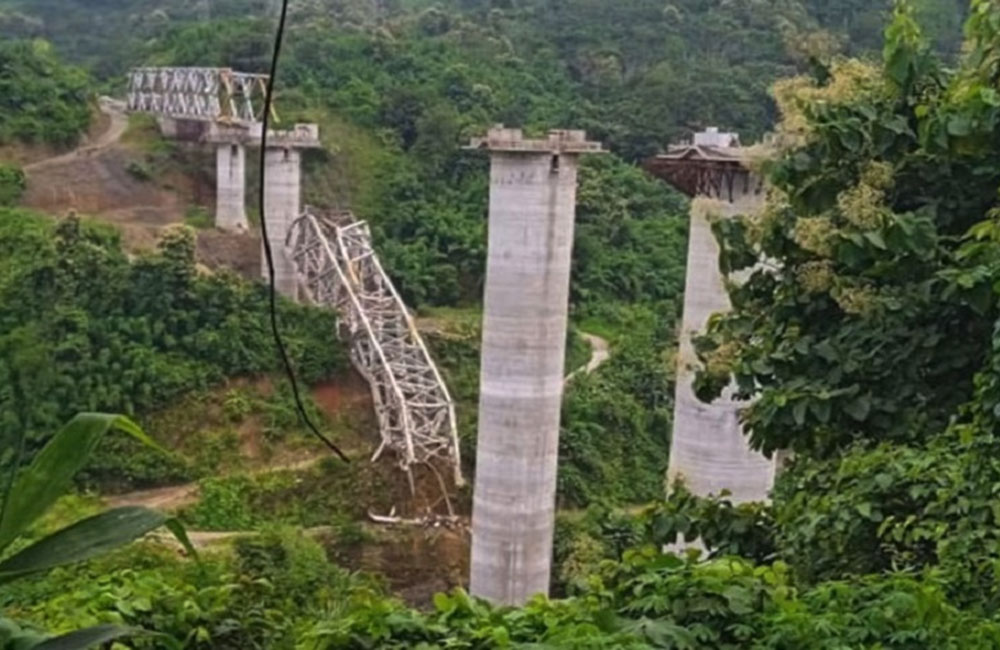
At least 26 killed after railway bridge collapses in India
A railway bridge being built across a ravine in India’s northeastern Mizoram state has collapsed, killing at least 26 labourers working on the project, officials said, with many others reported missing.
Video footage on X, formerly known as Twitter, posted by Mizoram Chief Minister Zoramthanga on Wednesday showed a metal frame that had toppled off towering columns into a wooded valley below.
The accident happened at Sairang, a town about 20km (12 miles) from Aizawl, the capital of Mizoram which lies in the far east of India, bordering Myanmar.
State Transport Minister T J Lalnuntluanga, who was at the site, said 18 bodies have been recovered while eight other bodies have been located and are being pulled out of the debris by rescuers.
People living in a village near the construction site rushed to rescue injured workers and took them to hospital, police said.
Rescuers from the government-run National Disaster Response Force also hurried to the scene to search for survivors.
The Northeast Frontier Railway (NFR) said in a statement on X that the mishap occurred during work on the Bhairbi-Sairang New Line Railway Project.
The NRF said on its website the project will connect Mizoram to the rest of the country, boosting “tourism and socio-economic development”.
A “high-level enquiry committee” had been set up to investigate, the NFR said.
The government will pay about 200,000 Indian rupees ($2,400) to the next of kin of those killed, reports said.
“Rescue operations are underway and all possible assistance is being given to those affected,” the office of Prime Minister Narendra Modi said. (AL Jazeera)
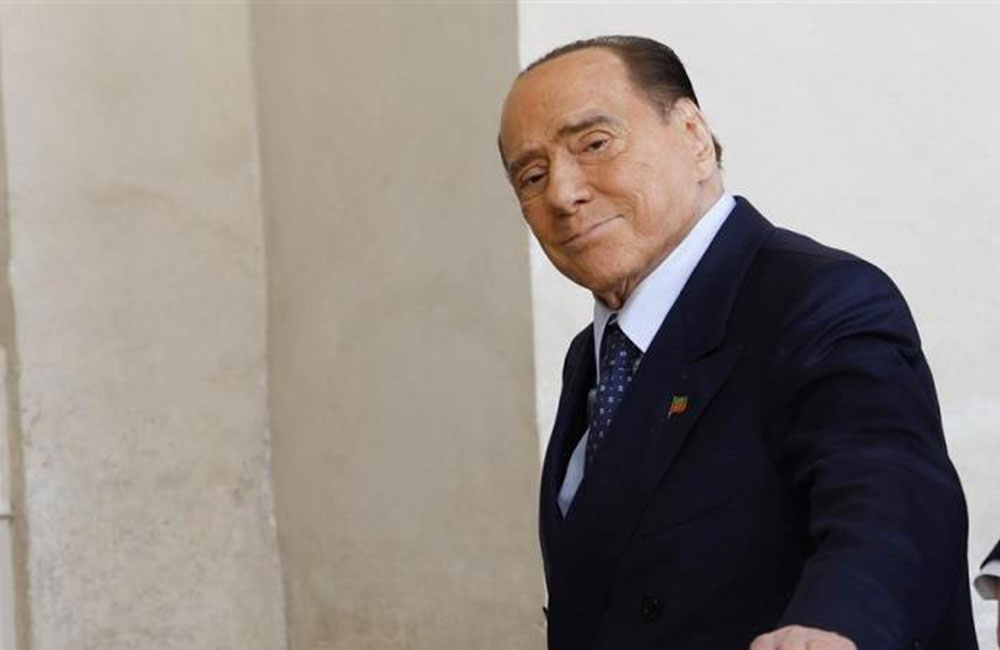
Former Italian PM Silvio Berlusconi has died - sources
Former Prime Minister Silvio Berlusconi, a billionaire businessman who created Italy’s largest media company before transforming the political landscape, has died on Monday, according to sources.
Berlusconi, who was 86, had been suffering from leukaemia “for some time” and had recently developed a lung infection.
Berlusconi’s Forza Italia party is part of Prime Minister Giorgia Meloni’s right-wing coalition, and although he himself did not have a role in government, his death is likely to destabilise Italian politics in the coming months.
Source – Reuters

Real estate tycoon Srettha Thavisin secures votes to become Thailand’s 30th prime minister
Srettha Thavisin from the populist Pheu Thai party secured enough votes in parliament to become the country’s 30th prime minister Tuesday.
While the vote was still ongoing, his supporters celebrated an end to months of post-election uncertainty in which the winning progressive Move Forward Party was blocked from taking power by conservative senators.
Srettha, a real estate tycoon, will lead a coalition of 11 parties assembled by Pheu Thai that includes two pro-military parties affiliated with outgoing Prime Minister Prayuth Chan-ocha.
Move Forward was excluded from the coalition. Critics called the new government a betrayal of the election results, but Pheu Thai leaders defended it as a necessity for ending the political deadlock and creating reconciliation.
The vote came hours after former Prime Minister Thaksin Shinawatra began an eight-year prison sentence after returning from years of self-imposed exile. Many have speculated that the party embraced its former enemies in an effort to reduce or cancel Thaksin’s prison sentence, something the party denies.
Source - AP News
Agencies
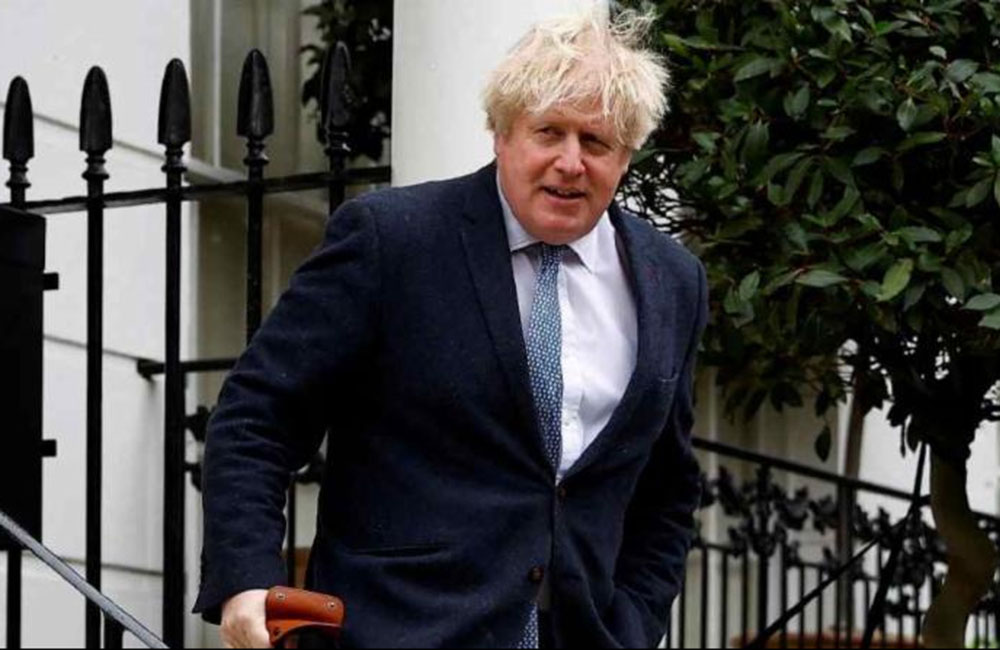
Former UK PM Boris Johnson resigns from Parliament over 'Partygate'
Former UK Prime Minister Boris Johnson resigned from Parliament late Friday after an investigation found that he had lied to a parliamentary committee inquiring into 'Partygate' - parties that he had hosted during the COVID lockdown period in contravention of public health requirements.
Johnson was given an advance copy of the report by the Parliamentary Privileges Committee that is to be released publicly next week. The committee found that he lied to them during the inquiry, and 'impugned the integrity' of the House of Commons.
Johnson admitted misleading parliament but said he did not do it on purpose. He accused the committee of a witchhunt against him.
Following media revelations, he was accused of hosting several parties at 10, Downing Street, the PM's official residence, in contravention of COVID lockdown rules. He was then fined by public health authorities for these transgressions. He admitted to hosting the parties but claimed that social distancing rules were followed.
Johnson has been an MP from the Tory Party and was Prime Minister from 2019-2022. He was an MP for Henley from 2001-08, and again from 2015-222 for Uxbridge and South Ruislip.

British nurse found guilty of murdering seven newborn babies in hospital
A British nurse was found guilty Friday of murdering seven newborn babies and trying to murder six others at the hospital neonatal unit where she worked, becoming the UK’s most prolific killer of children.
Lucy Letby, 33 — on trial since last October — was accused of injecting her young victims, who were either sick or born prematurely, with air, overfeeding them milk and poisoning them with insulin.
The jury at Manchester Crown Court in northern England reached all of its verdicts after deliberating for 22 days.
Letby was arrested following a string of baby deaths at the neonatal unit of the Countess of Chester Hospital in northwest England between June 2015 and June 2016.
Described by the prosecution as a “calculating” woman who used methods of killing that “didn’t leave much of a trace”, Letby had repeatedly denied harming the children.
“Lucy Letby was entrusted to protect some of the most vulnerable babies. Little did those working alongside her know that there was a murderer in their midst,” Senior Crown Prosecutor Pascale Jones said in a statement.
“Time and again, she harmed babies, in an environment which should have been safe for them and their families,” the prosecutor added, calling the killings “a complete betrayal of the trust placed in her”.
‘Playing God’
The court heard that colleagues raised concerns after noticing that Letby was on shift when each of the babies collapsed, with some of the newborns attacked just as their parents left their cots.
Prosecutor Nick Johnson said Letby “gaslighted” her colleagues into believing the string of deaths were “just a run of bad luck”.
Letby’s final victims were two triplet boys, referred to in court as babies O and P.
Child O died shortly after Letby returned from a holiday in Ibiza in June 2016, while child P died a day after their sibling.
Letby was also said to have attempted to kill the third triplet, child Q, but the jury was unable to reach a verdict on the charge.
Johnson said that by that time Letby was “completely out of control”, adding that “she was in effect playing God”.
Letby was arrested and released twice. On her third arrest in 2020 she was formally charged and held in custody.
During searches at her home, police found hospital paperwork and a handwritten note on which Letby had written: “I am evil, I did this.”
Letby later tried to explain the note by saying she wrote it after being placed on clerical duties following the death of the two triplets.
‘Something wrong’
She said that decision to remove her from medical duties had left her feeling like she had “done something wrong”.
Barrister Ben Myers, defending Letby, told the court she was “hardworking, deeply committed” and “loved her work”.
He pointed to the fragile health of the babies, many of whom were born prematurely, and said the neonatal unit was overstretched and understaffed.
Letby also suggested that a “gang” of four senior doctors pinned blame on her to cover for the hospital’s failings.
When Letby took the stand at her trial, she insisted she “always wanted to work with children” and said it was “devastating” to find out she was blamed for the deaths.
The case revived memories of two of Britain’s infamous medical murderers, doctor Harold Shipman and nurse Beverley Allitt.
Shipman, a general practitioner, hanged himself in prison in 2004, four years after being convicted of killing 15 of his patients.
A later public inquiry concluded he killed about 250 patients with lethal morphine injections between 1971 and 1998.
Allitt — a nurse dubbed the “angel of death” — was jailed for life in 1993 after being convicted of murdering four young children in her care, attempting to murder three others and causing grievous bodily harm with intent to six more.
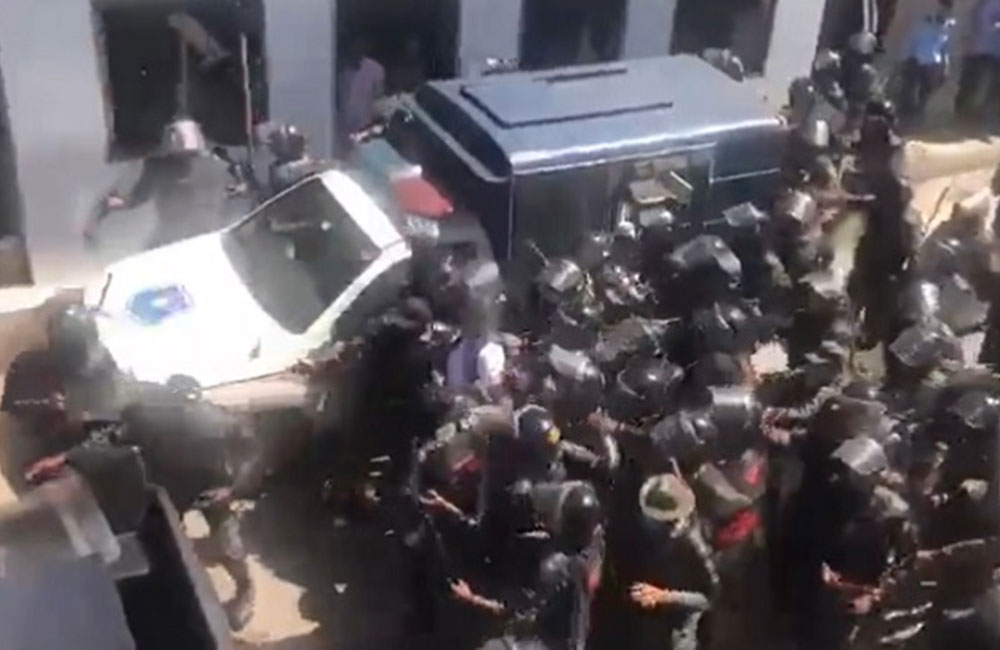
Former Pakistan PM Imran Khan arrested outside Islamabad court?
Former Pakistani Prime Minister Imran Khan has been arrested during a court appearance in the capital Islamabad.
Fawad Chaudhry of Khan’s Pakistan Tehreek-e-Insaf (PTI) party confirmed the arrest in a tweet on Tuesday.
Chaudhry tweeted that the Islamabad High Court complex has been “occupied” by the Pakistani Rangers paramilitary and that lawyers were “being subjected to torture”.
Video footage on local media showed Khan being escorted to a Rangers vehicle.
In a tweet, PTI said the Rangers have “abducted” Khan.
“Pakistan’s brave people must come out and defend their country,” the party posted. (AL Jazeera)
Page 12 of 50